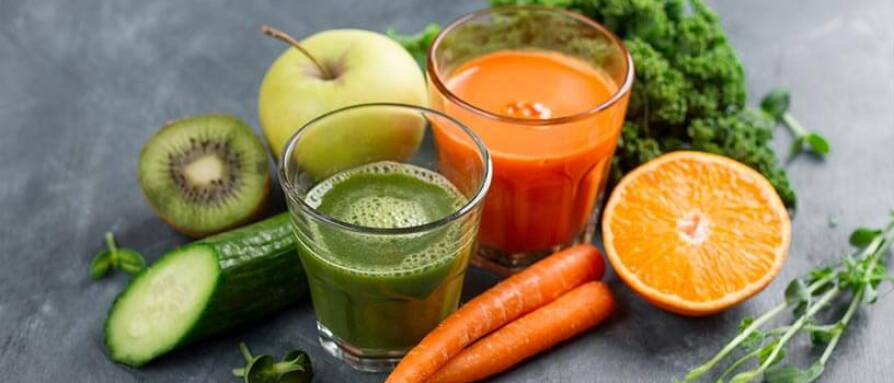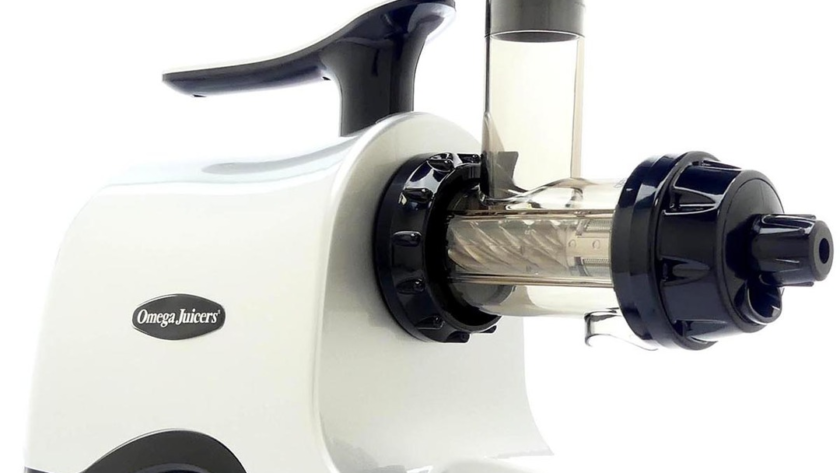We’re gonna be looking at the four main types of juicers on the market — centrifugal force juicer, masticating juicer, twin gear juicer, and juice press — and analyzing what makes them great, reasons to avoid each, and what type of person each juicer is perfect for
Centrifugal Force Juicer
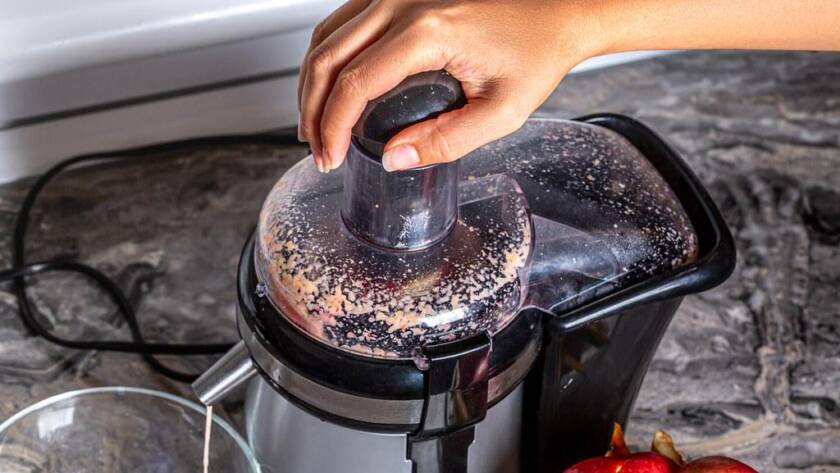
This is probably the type of juicer you’re most familiar with. Fruit is juiced thanks to a cutting disc, which tears and shreds the juice and then pulls it to the edge via centrifugal force (thus the name!)
What’s Great About It: As far as a price tag, this juicer can’t be beaten. High-quality ones will probably cost you more than $100, but you can still get a good bargain for that price. It’s definitely the most intuitive and fast by far, easy-to-use even if you’re not familiar with juicers. It also takes up minimal shelf and counter space for easy storage.
What’s Not-So-Great About It: Compared to the other types, the centrifugal produces subpar quality juice. The juice will contain a lot of pulp and it’ll separate quickly if you leave it out for too long. Don’t go to this juicer if you’re a fan of greens or wheatgrass, because this one can pretty much only handle your standard juices.
Who It’s Meant For: If you’re on a budget and you don’t mind a lower-quality juice product, then this is definitely the machine for you. It’s also great if you’re a first-time juicer just wanting to start drinking more juice.
Masticating Juicer
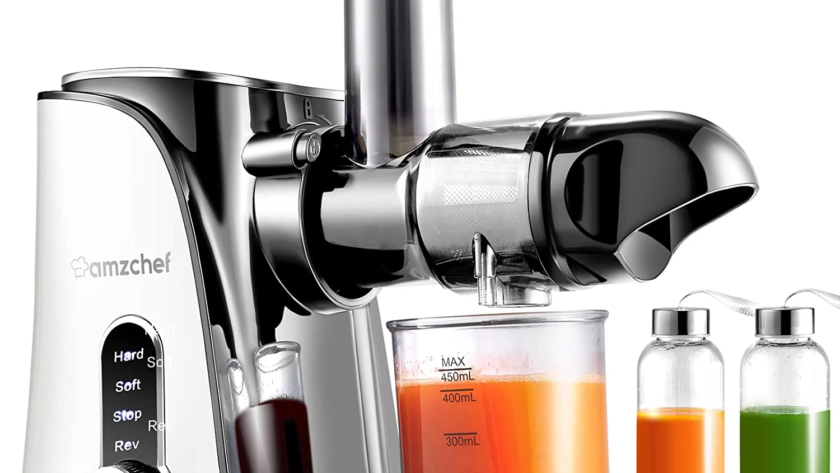
Image Courtesy of AMZ Chef
This juicer is a step above your average centrifugal, using an auger to crush your ingredients and then separate them from the pulp using a strainer.
What’s Great About It: The masticating juicer kicks it up a notch in reliability and juice yield. Your juice lasts longer than a standard centrifugal, and it even functions as a grain mill so you can use it with greens and wheat grass. Another great thing about this juicer is that you can also process frozen fruits for a delicious treat.
What’s Not-So-Great About It: What it makes up for in juice quality it loses in speed and clean-up time. This is a much slower juicer than the centrifuge, and cleaning up in between juices can be a real pain. It still has a pretty high pulp content as far as juicers go, which can be frustrating given its higher price tag compared to the centrifuge, with the low-end being comfortably more than $100.
Who It’s Meant For: If you want a juicer that will bring you higher quality juice and can do a lot more than a standard centrifuge, this is the juicer for you.
Twin Gear Juicer
Image Courtesy of Energise Your Life
The twin gear juicer is a higher level of machine, as it now uses two augers to further crush your ingredients and deliver you higher quality and more nutritious juice.
What’s Great About It: For those who want to get healthier with their juice, the twin gear rocks! It extracts way more nutrients than both centrifugal and masticating juicers. It’s also way more flexible than the first two options, allowing you to make everything from baby food to nut butter to sorbets to pasta. Also, if you’re worried about your juicer making too much noise, the twin gear juicer is much quieter than the previous ones.
What’s Not-So-Great About It: It’s very slow, especially compared to the first too. It’s also significantly harder to clean due to its design, which can be frustrating if you want to get to more than one juice. Don’t expect your pulp problem to be fully solved either, as this still has relatively high levels of pulp in it (albeit lower than masticating and centrifugal) It’s also considerably more expensive than a masticating
Who It’s Meant For: If you wanna take the next step with your juicer and have a reliable all-purpose machine, then this juicer is perfect for you. Its clean-up process is not for the impatient, though.
Juice Press
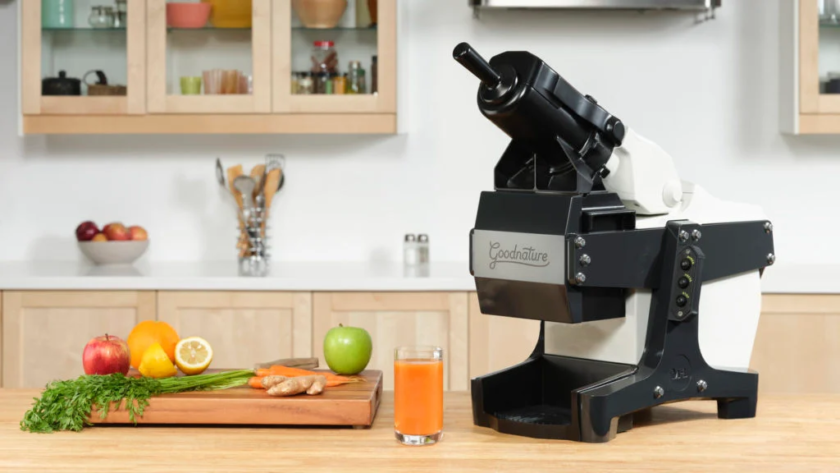
Image courtesy of Goodnature
The juice press (or cold press juicer) is the undisputed champion of the juice world, gently pressing the ingredients to extract juice while maintaining low heat and oxidation.
What’s Great About It: Let’s not beat around the bush. You won’t get a higher level of juice from any other juicer. This juice is 99% juice and 1% solids or pulp, meaning it has no foam, minimal oxidation, and incredibly long shelf life. You can also make high-quality dairy-free milk and nut oils, giving you more flexibility out of this machine.
What’s Not-So-Great About It: Quality comes at a price, this price being thousands and thousands of dollars. For some, the higher quality juice might be worth it, but for others, that’s simply too much to ask. It’s also not super user-friendly. It can be a real pain to clean and maintain too.
Who It’s Meant For: If you’re willing and able to break the bank, then there’s simply no better juice you’ll get on the market than a high-quality cold-press juicer.
Conclusion
When buying your juicer, make sure you’re considering many things. Are you looking for more than fruits and veggies? How much are you willing to pay? What quality of juice am I willing to put up with?
No matter what juicer you decide on, give yourself a pat on the back for committing yourself to live a healthier lifestyle.

